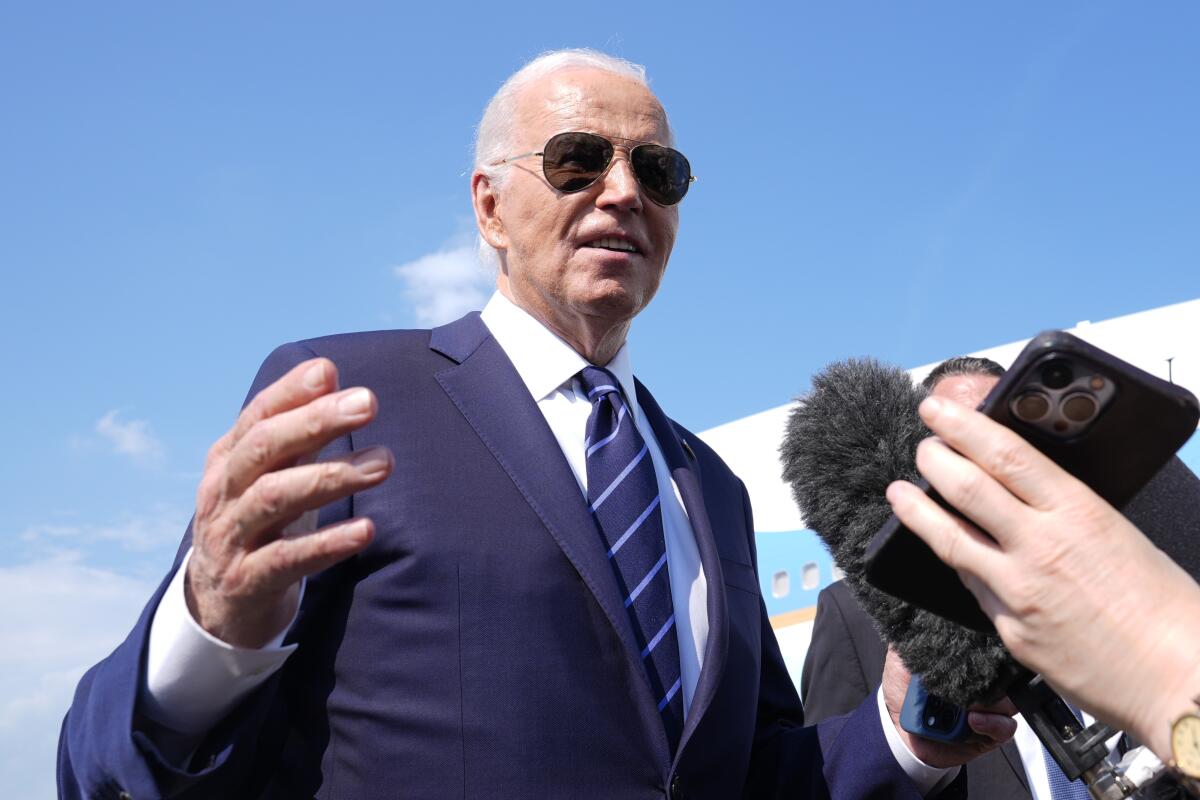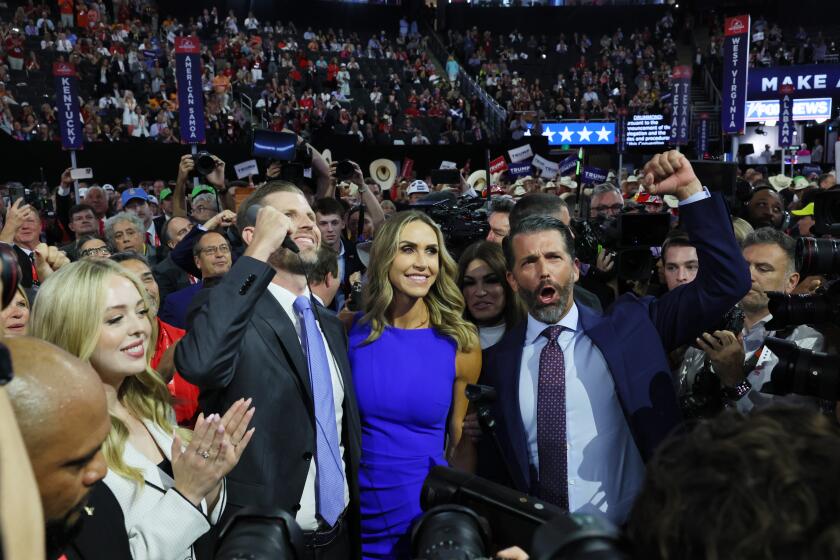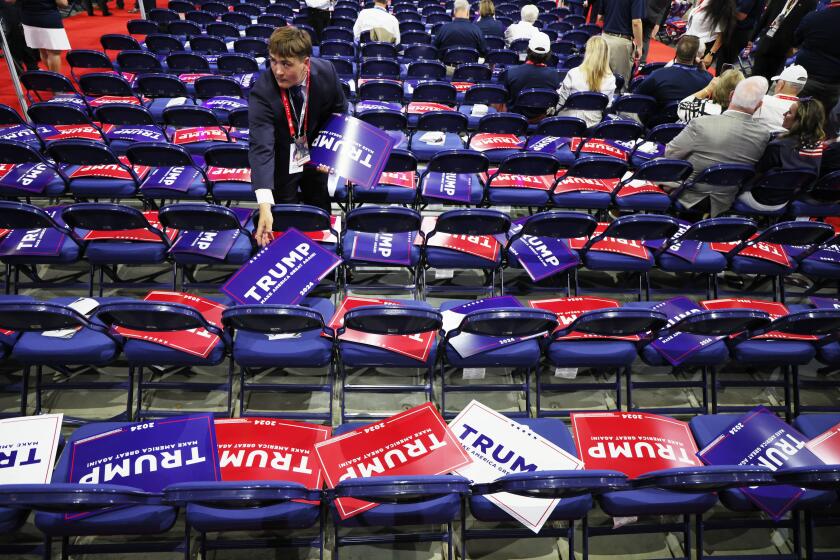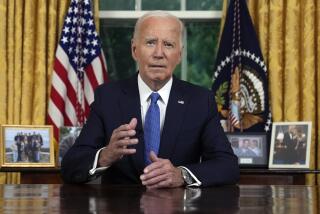Biden says ‘bull’s-eye’ remark was mistake, but that Trump is guilty of worse rhetoric

President Biden said in an interview with NBC’s Lester Holt on Monday that it was a “mistake” to say before the weekend assassination attempt on former President Trump that it was “time to put Trump in the bull’s-eye.”
However, Biden said he only meant that the nation’s focus should be on Trump and the “threat to democracy” he represents. He also said Trump has repeatedly engaged in worse rhetoric — including by “making fun of” and “joking about” the attack on Rep. Nancy Pelosi’s husband, Paul, at their home in San Francisco in 2022.
“I didn’t say crosshairs. I was talking about focus on,” Biden said of his remark.
“Focus on what he’s doing, focus on his policies, focus on the number of lies he told at the debate. I mean, there’s a whole range of things,” Biden said. “Look, I’m not the guy who said I want to be a dictator on day one, I’m not the guy that refused to accept the outcome of the election.”
Two days after he survived an assassination attempt, former President Donald Trump officially became the Republican nominee for president for the third straight time.
“You can’t only love your country when you win,” Biden said. “And so the focus was on what he’s saying.”
Holt asked Biden whether he has done “a little soul-searching” about things he’d said that could “incite people who are not balanced.”
“How do you talk about the threat to democracy, which is real, when a president says things like he says? Do you just not say anything because it might incite somebody?” Biden said.
“Look, I ... have not engaged in that rhetoric. Now, my opponent has engaged in that rhetoric. He talks about there will be a bloodbath if he loses, talking about how he is going to forgive all those — actually, I guess suspend the sentences of — all those who were arrested and sentenced to go to jail because of what happened at the Capitol” on Jan. 6.
He asked Holt whether he remembered when Trump mocked the attack on Pelosi.
The interview was set to be aired in full Monday evening. Holt described it as the first in an “unscripted setting” since the assassination attempt on Trump at a campaign rally in Pennsylvania on Saturday.
The interview drew some political attention back to Biden on the first day of the Republican National Convention in Milwaukee, where Trump formally received the party’s nomination.
Biden previously spoke to the attack on Trump in remarks late Saturday, just hours after Trump was shot, when he said “everybody must condemn” political violence. On Sunday, he gave a prime-time national address from the Oval Office where he again condemned the violence and asked everyone, amid high passions, to “cool it down.”
His campaign has pulled down attack ads against Trump in the wake of the shooting. Still, critics on the right have latched on to previous campaign rhetoric denouncing Trump, including the “bull’s-eye” comment, to suggest that Biden and Democrats more broadly were partly to blame for the shooting.
Biden told Holt that he didn’t know whether the shooting had changed the trajectory of the race.
Monday’s interview, which was scheduled before the assassination attempt, also was Biden’s latest chance to project competence after his disastrous debate performance last month, which elevated concerns, including from within his own party, about his age and his ability to lead.
Biden is 81. Trump is 78.
Biden told Holt that questions about his age were understandable, but that he’s “only three years older than Trump” and his “mental acuity has been pretty damn good.” He again insisted that he will not be dropping out of the race.
“I’ve gotten more done than any president has in a long time in 3½ years,” Biden said, according to an early NBC story about the interview. “I’m willing to be judged on that.”
Republicans and Democrats alike have called for a kinder, gentler campaign in the wake of the assassination attempt on Donald Trump. But will they really tone it down? And more importantly, should they?
Biden has been under an intense microscope since the June 27 debate, where he repeatedly lost his train of thought and failed to challenge Trump’s talking points and falsehoods. He sounded hoarse and came out stiff, and the performance heightened concerns for many about his age.
Biden rebuffed calls for him to bow out in the days after, saying he may not be a “young man” anymore but still knew how to do the job well.
Biden gave an interview to ABC’s George Stephanopoulos on July 5, where he dismissed his debate performance as a “bad episode” and rejected the idea that he had any serious health condition that would undermine his ability to do the job. He also rejected the idea of submitting to an independent medical evaluation, saying the job of the presidency presented him with a “cognitive test every single day” — which he said he is passing while also being out on the campaign trail.
On July 11, Biden held a nearly hourlong news conference at which he answered a range of questions from the news media, including on foreign policy. There, he sounded defiant and boasted of his track record getting legislation passed.
He called himself the “most qualified person to run for president,” and said he would defeat Trump in November. “I beat him once, and I will beat him again.”
More to Read
Get the L.A. Times Politics newsletter
Deeply reported insights into legislation, politics and policy from Sacramento, Washington and beyond. In your inbox three times per week.
You may occasionally receive promotional content from the Los Angeles Times.













